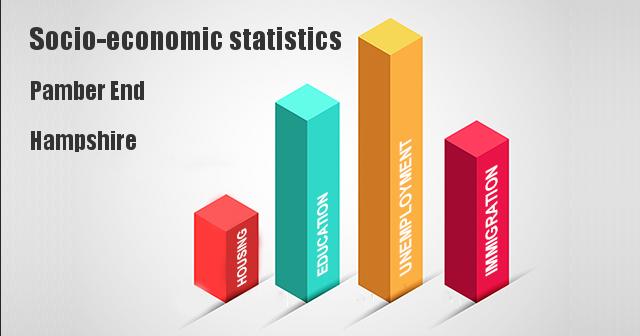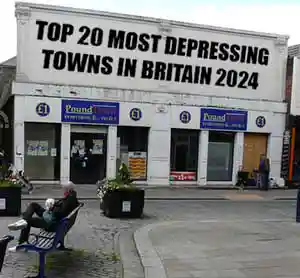Is Pamber End in Basingstoke and Deane a nice place to live or is it a bit rough? We have collated a series of socio-economic statistics and demographics from UK government sources such as the 2021 Census and the Index of Multiple Deprivation. They should give you a broad snapshot of the area and the surrounding locations. Are the residents of Pamber End older than the national average or younger? What is the population of Pamber End and Basingstoke and Deane? What is the claimant count in Pamber End and how many residents are unemployed? This page should provide you with the answers.Pamber End & Immigration Statistics
We have analysed the Census 2021 raw data on country of birth and compiled immigration statistics as percentages of the population. All percentages have been rounded to two decimal places. Below are the figures for Pamber End in the local area district.
| Area | Born in UK | Born outside UK |
|---|
| 0% | 0% |
|---|
| 0% | 0% |
|---|
| 0% | 0% |
|---|
| 0% | 0% |
|---|
Pamber End compared to other wards in
| # | Ward | Born in UK | Born outside UK |
|---|
';Pamber End is ranked out of 0 wards in for the number of residents born outside of the UK.Pamber End Age Distribution Statistics
We have taken the raw data from the 2021 Census and the calculated the proportion of age groups in .| Age Band | Proportion |
|---|
| 4 & under |  |
| 5 - 9 years |  |
| 10 - 15 years |  |
| 16 - 19 years |  |
| 20 - 24 years |  |
| 25 - 34 years |  |
| 35 - 49 years |  |
| 50 - 64 years |  |
| 65 - 74 years |  |
| 75 - 84 years |  |
| 85 years & over |  |
How many residents own or rent their home in Pamber End and
We have taken the raw data from the 2021 census and calculated what proportion of people in Pamber End either own or rent their home. All percentages have been rounded to two decimal places. 0 of residents own their home either outright or mortgaged. 0 of Pamber End residents rent their home either privately or through a social landlord. | Area | Owned | Rented |
|---|
| 0% | 0% |
| 0% | 0% |
| 0% | 0% |
| 0% | 0% |
Pamber End has a higher level of home ownership than than the national average.
Pamber End compared to other wards in
Pamber End is ranked out of 0 wards in for the percentage of home owners.Pamber End Unemployment Statistics
Since the introduction of Universal Credit, The Department for Work & Pensions have not issued any statistics (in our view) that can be used to ascertain the levels of unemployment or under employment in the UK, just meaningless geographic counts. However, the Office of National Statistics does publish claimant counts of people receiving out of work benefits, be that legacy Jobseeker’s Allowance or Universal Credit as a proportion of people over 16. These figures are usually updated once a month and are for Local Authority Districts and Unitary Authority Districts. So below are the figures of .| Area | Unemployed | Yearly Change |
|---|
| % | % |
| % | % |
| % | % |
| UK | 3.7% | -0.3% |
| Economic Status | Proportion |
|---|
| In Employment | 0% |
| In Part-Time Work | 0% |
| Unemployed | 0% |
Pamber End Education Statistics
We have taken the raw data from the 2021 census to found of the level of education Pamber End residents have in terms of formal qualifications as a percentage. The UK government breaks qualifications down into 7 levels. A detailed explanation of these levels can be found here. However, the Census groups these into just 4 \'levels\'. Here are some examples of the qualifications each census level represents when not stated;
- Level 1 - GCSE grades D, E, F, or G & below
- Level 2 - GCSE A*, A, B, C or O Level grades A, B or C
- Level 3 - A or AS qualification at any grade
- Level 4 - HNC, Bachelors Degree, Masters Degree or Phd
In this first table we have compared Pamber End to the national average for .
| Level | | |
|---|
| No Qualifications | 0% | 0% |
| Level 1 | 0% | 0% |
| Level 2 | 0% | 0% |
| Apprenticeship | 0% | 0% |
| Level 3 | 0% | 0% |
| Level 4 | 0% | 0% |
Pamber End Health Statistics
| Area | VG | G | F | B | VB |
|---|
| 0% | 0% | 0% | 0% | 0% |
| 0% | 0% | 0% | 0% | 0% |
| 0% | 0% | 0% | 0% | 0% |
| 0% | 0% | 0% | 0% | 0% |
VG = Very Good, G = Good, F = Fair, B = Bad & VB = Very Bad
What are the occupations of the residents of Pamber End?
The largest employment sector in Pamber End is Managers, Directors & Senior Officials. The smallest employment sector is Elementary Occupations.| Sector | Proportion |
|---|
| Managers, Directors & Senior Officials | % |
| Professional Occupations | % |
| Associate Professional & Technical | % |
| Administrative & Secretarial | % |
| Skilled Trades | % |
| Caring, leisure & Other Services | % |
| Process Plant & Machine Operatives | % |
| Elementary Occupations | % |
What is the population of Pamber End and Basingstoke and Deane?
The table below contains the populations figures for each ward in Basingstoke and Deane including Pamber End. These population ONS figures are estimated are dated Mid 2020.
| Ward | Population |
|---|
| Basing | 8368 |
| Baughurst and Tadley North | 5170 |
| Bramley and Sherfield | 6796 |
| Brighton Hill North | 5226 |
| Brighton Hill South | 5398 |
| Brookvale and Kings Furlong | 7071 |
| Buckskin | 7233 |
| Burghclere, Highclere and St Mary Bourne | 6109 |
| Chineham | 10071 |
| East Woodhay | 3018 |
| Eastrop | 6764 |
| Grove | 6008 |
| Hatch Warren and Beggarwood | 8680 |
| Kempshott | 6530 |
| Kingsclere | 4879 |
| Norden | 10160 |
| Oakley and North Waltham | 7137 |
| Overton, Laverstoke and Steventon | 5112 |
| Pamber and Silchester | 4321 |
| Popley East | 7099 |
| Popley West | 6975 |
| Rooksdown | 5420 |
| Sherborne St John | 2777 |
| South Ham | 8879 |
| Tadley Central | 2735 |
| Tadley South | 5576 |
| Upton Grey and The Candovers | 2643 |
| Whitchurch | 5600 |
| Winklebury | 6005 |
| Basingstoke and Deane Total | 177760 |
Last updated: 20/02/2024, Additional Sources: Office for National Statistics & Department for Work & Pensions.














